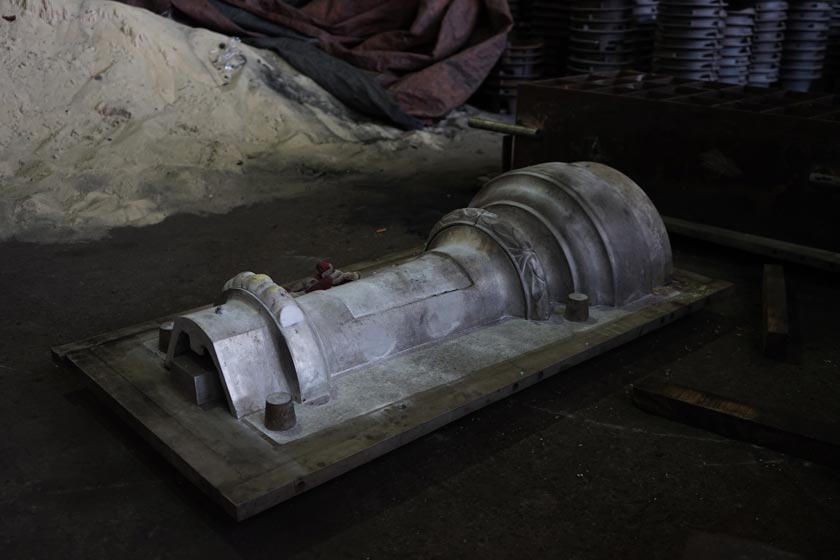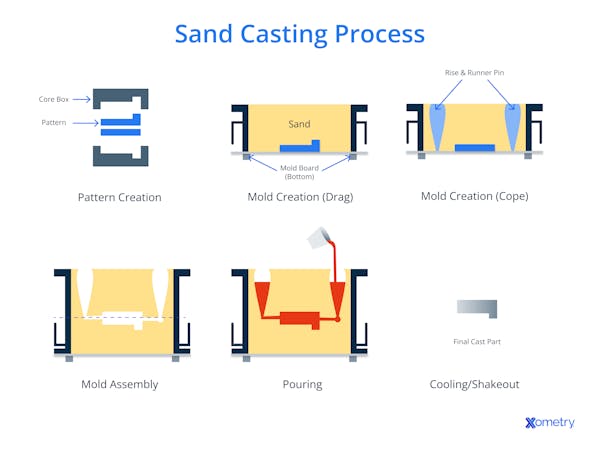Finding out what makes Aluminum Foundry Wisconsin important in casting
Comprehending the Perks and Innovations in the Aluminum Foundry Sector
The Aluminum Foundry industry plays a crucial duty in modern manufacturing. Its lightweight buildings notably boost fuel performance, specifically in automotive and aerospace fields. Furthermore, Aluminum's resistance to rust assurances long life in numerous applications. As the sector develops, innovations such as innovative recycling and additive production are reshaping manufacturing methods. Checking out these developments discloses not just the advantages however additionally the difficulties in advance for Aluminum factories in a quickly changing market.
The Lightweight Benefit of Aluminum
Aluminum's light-weight nature offers considerable benefits throughout various markets, specifically in production and transport. Its low thickness enables for the production of elements that are much easier to install and deal with, resulting in decreased labor expenses and enhanced effectiveness. In the vehicle field, lighter cars add to improved fuel economy and lower emissions, aligning with worldwide sustainability goals. In aerospace, the usage of Aluminum minimizes the general weight of aircraft, which is important for enhancing efficiency and lowering functional prices.
Additionally, Aluminum's light-weight residential or commercial properties assist in innovative styles that were formerly impractical with much heavier products. This flexibility makes it possible for manufacturers to create complicated shapes and frameworks while keeping structural stability. In general, the lightweight benefit of Aluminum not just boosts product performance but additionally drives innovations in modern technology and style, making it a preferred material in numerous applications.
Corrosion Resistance and Sturdiness
The Aluminum Foundry sector is renowned for generating materials with exceptional corrosion resistance, making them perfect for numerous applications. This home, incorporated with enhanced architectural stability, adds to the lasting efficiency benefits that Aluminum parts use. As a result, markets increasingly count on Aluminum to satisfy demanding environmental conditions without jeopardizing high quality.
Superior Corrosion Resistance
While different metals face substantial challenges from ecological elements, Aluminum attracts attention for its premium corrosion resistance, making it a recommended choice in many applications. This building is mainly because of a natural oxide layer that bases on the Aluminum surface area, giving a barrier versus dampness and destructive representatives. Unlike various other metals that might rust or deteriorate over time, Aluminum keeps its honesty even in severe environments, such as industrial settings or seaside areas. In addition, its light-weight nature incorporated with deterioration resistance makes it excellent for applications in aerospace, automobile, and aquatic sectors. On the whole, Aluminum's remarkable longevity not only enhances item durability but additionally reduces maintenance expenses, presenting an engaging benefit for producers and customers alike.
Enhanced Structural Stability
Designers and engineers increasingly identify the significance of improved architectural stability in modern-day applications, where both corrosion resistance and sturdiness are essential. Aluminum alloys, understood for their lightweight buildings, likewise display phenomenal resistance to deterioration, making them suitable for harsh environments. The innovative techniques used in the Aluminum Foundry market contribute considerably to producing components with boosted sturdiness. Advanced casting procedures and alloy compositions are customized to fulfill details efficiency demands, making sure that frameworks can stand up to severe conditions without compromising integrity. Surface therapies and coverings improve the lifespan of Aluminum products, better alleviating deterioration over time. This focus on boosted architectural integrity not only extends the use of materials yet also lowers maintenance prices, strengthening Aluminum's position as a material of selection in various markets.
Durable Efficiency Advantages
Resilient efficiency in Aluminum components is greatly credited to their premium deterioration resistance and toughness. Unlike many metals, Aluminum normally forms a safety oxide layer, which protects against corrosion and deterioration in various environments, consisting of industrial and marine setups. This integral residential or commercial property substantially extends the life-span of Aluminum items, reducing maintenance and substitute expenses. In enhancement, the lightweight nature of Aluminum enhances its applicability across industries without jeopardizing toughness. The material's resistance to damage additionally contributes to its dependability sought after applications, making it an excellent selection for vehicle, aerospace, and building and construction markets. As sectors significantly prioritize sustainability and long life, Aluminum's efficiency benefits straighten with contemporary design requirements, solidifying its function in cutting-edge production processes.
Ecological Effect and Sustainability
 As the Aluminum Foundry sector develops, it increasingly focuses on environmental impact and sustainability, recognizing the requirement for responsible methods despite environment adjustment. Initiatives to decrease waste and energy consumption are at the center, with numerous shops embracing recycling initiatives to reclaim Aluminum scrap. This not just decreases basic material use however also significantly reduces energy expense, as recycled Aluminum needs just a portion of the energy compared to primary production.
As the Aluminum Foundry sector develops, it increasingly focuses on environmental impact and sustainability, recognizing the requirement for responsible methods despite environment adjustment. Initiatives to decrease waste and energy consumption are at the center, with numerous shops embracing recycling initiatives to reclaim Aluminum scrap. This not just decreases basic material use however also significantly reduces energy expense, as recycled Aluminum needs just a portion of the energy compared to primary production.Innovations in discharges regulate innovations are being carried out to reduce air toxins, aligning operations with more stringent environmental policies. Factories are likewise exploring different power sources, such as solar and wind, to power their facilities sustainably. By fostering cooperation with stakeholders, the sector aims to develop innovative options that enhance eco-friendly stewardship. Collectively, these initiatives highlight page a dedication to minimizing the Aluminum Foundry's carbon footprint while advertising a circular economic climate within the production field.
Advanced Manufacturing Techniques
 Changing production processes, the Aluminum Foundry market is significantly integrating sophisticated manufacturing strategies to boost efficiency and accuracy. Methods such as computer numerical control (CNC) machining and additive manufacturing have become important parts in maximizing production operations. CNC machining permits high-precision element manufacture, substantially reducing product waste and production time. Additive manufacturing opens up brand-new methods for complex geometries and lightweight designs that were formerly tough to accomplish.
Changing production processes, the Aluminum Foundry market is significantly integrating sophisticated manufacturing strategies to boost efficiency and accuracy. Methods such as computer numerical control (CNC) machining and additive manufacturing have become important parts in maximizing production operations. CNC machining permits high-precision element manufacture, substantially reducing product waste and production time. Additive manufacturing opens up brand-new methods for complex geometries and lightweight designs that were formerly tough to accomplish.Additionally, the implementation of automation and robotics in Aluminum factories improves procedures, reduces human error, and enhances worker safety and security. These innovations promote a more receptive production setting, making it possible for suppliers to adapt rapidly to market demands. The combination of advanced simulation software additionally boosts the style and screening phases, leading to premium item high quality. Jointly, these methods not just improve functional efficiency yet likewise foster advancement, placing the Aluminum Foundry industry at the leading edge of contemporary production.
Technologies in Recycling Processes
The Aluminum Foundry industry is not just advancing in visit this page producing methods yet is additionally making substantial strides in recycling processes. Technologies are arising to boost the effectiveness of recycling methods, decreasing power consumption and improving sustainability. Advanced sorting modern technologies, such as automated optical sorting, enable the recognition and splitting up of Aluminum from other materials with high accuracy. This causes a better of recycled Aluminum, which is important for maintaining the integrity of the end products.
Closed-loop recycling systems are being applied, enabling manufacturers to reuse Aluminum scrap within their own manufacturing processes. This lessens waste and advertises a round economic climate. Furthermore, study into brand-new recycling techniques, such as hydrometallurgical procedures, provides the capacity for recouping Aluminum from complex waste streams. These technologies not just add to reducing the carbon impact of the Aluminum Foundry industry yet also reinforce its economic practicality in a progressively ecologically aware market.
Applications Throughout Various Industries
Countless sectors are progressively acknowledging the versatility and benefits of Aluminum Foundry items, leading to extensive applications throughout fields such as automobile, consumer, aerospace, and construction products. In the automobile sector, Aluminum castings contribute to light-weight automobile layouts, improving gas efficiency and efficiency. Aerospace makers utilize Aluminum components for their strength-to-weight proportion, crucial for airplane frameworks and elements.
In building, Aluminum is preferred for its sturdiness and resistance to rust, making it optimal for home window frameworks, roof covering, and structural supports. Durable goods likewise take advantage of Aluminum Foundry products, as seen in cookware, electronics, and product packaging, where lightweight and recyclable materials are vital.
The flexibility of Aluminum Foundry methods permits exact specs and elaborate layouts, satisfying the diverse needs of these industries. Therefore, Aluminum Foundry items are ending up being important to contemporary manufacturing procedures across numerous markets.
Future Trends in Aluminum Foundries
As industries continue to progress, Aluminum foundries are poised to embrace a number of vital trends that assure to boost performance and sustainability. One noticeable fad is the boosting adoption of digital innovations, including automation and imp source synthetic intelligence, which simplify procedures and boost quality assurance. Additionally, the press in the direction of lasting practices is leading factories to buy reusing modern technologies, considerably decreasing waste and energy consumption.
 One more emerging fad is the usage of sophisticated alloys and materials, satisfying the growing need for resilient and light-weight elements across different fields (Aluminum Foundry). The combination of additive production strategies is prepared for to revolutionize component layout, providing customization and reducing lead times.
One more emerging fad is the usage of sophisticated alloys and materials, satisfying the growing need for resilient and light-weight elements across different fields (Aluminum Foundry). The combination of additive production strategies is prepared for to revolutionize component layout, providing customization and reducing lead times.Cooperation with research institutions is likewise expected to drive technology, as factories look for to establish brand-new processes and products. Aluminum Foundry. Collectively, these patterns suggest a transformative future for the Aluminum Foundry market, straightening with broader goals of sustainability and efficiency
Often Asked Questions
What Are the Typical Expenses Associated With Aluminum Foundry Production?
The regular costs related to Aluminum Foundry production include raw products, labor, energy, equipment maintenance, and overhead expenditures. These elements collectively influence the overall economic investment needed for efficient Aluminum spreading operations.
How Does Aluminum Contrast to Other Metals in Stamina?
Aluminum, while lighter than numerous metals, displays outstanding strength-to-weight proportions. Compared to steel, Aluminum is less strong but provides exceptional corrosion resistance, making it a favorable option in applications where weight and resilience are necessary.
What Precaution Remain In Location in Aluminum Foundries?
Safety and security actions in Aluminum shops normally consist of required individual protective tools, ventilation systems to manage fumes, routine tools upkeep, training programs for staff members, and adherence to strict security regulations to reduce dangers connected with molten steel handling.
How Is Quality Assurance Managed in Aluminum Spreading Processes?
Quality assurance in Aluminum casting procedures includes strenuous examinations at different phases, consisting of raw material analysis, process surveillance, and end product screening. Methods such as statistical process control and non-destructive testing guarantee adherence to sector requirements.
What Accreditations Are Essential for Aluminum Foundry Suppliers?
The importance of accreditations for Aluminum Foundry vendors consists of ISO 9001 for top quality management, ISO 14001 for ecological management, and industry-specific criteria like ASTM and SAE, making sure compliance, security, and integrity in making processes.
The Aluminum Foundry sector plays an important role in modern manufacturing. The Aluminum Foundry industry is renowned for producing products with premium corrosion resistance, making them optimal for different applications. Transforming production procedures, the Aluminum Foundry industry is significantly incorporating advanced production techniques to enhance effectiveness and accuracy. The Aluminum Foundry industry is not just progressing in making methods yet is also making considerable strides in reusing processes. As sectors continue to develop, Aluminum factories are poised to accept numerous crucial trends that assure to enhance effectiveness and sustainability.